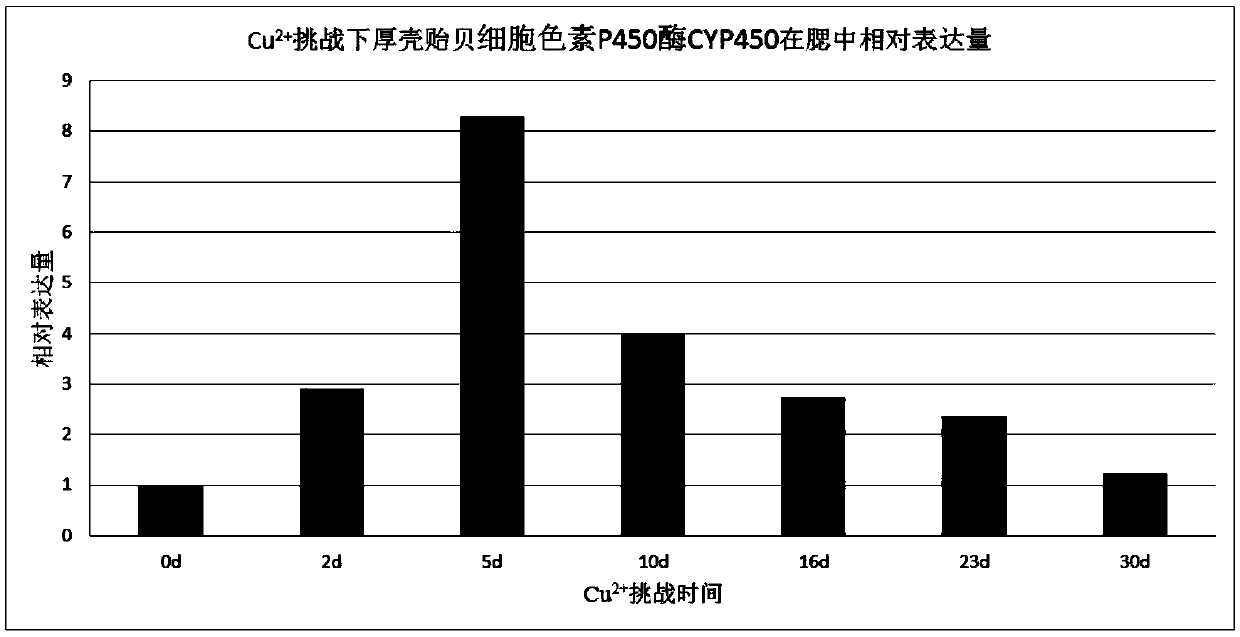Novel marine organism pollution detection marker
A technology for marine organisms and marine pollution, applied in the determination/inspection of microorganisms, biochemical equipment and methods, plant genetic improvement, etc., to avoid the decline of amplification efficiency, improve accuracy and stability, and increase the success rate of reaction. Effect
- Summary
- Abstract
- Description
- Claims
- Application Information
AI Technical Summary
Problems solved by technology
Method used
Image
Examples
Embodiment 1
[0042] 厚壳贻贝细胞色素P450酶CYP450,其基因的核苷酸序列为: ATGGTTGCGTTAACAGTTTACTTGGCAATAGCAGTGGCCTTGTGTGTAGCC GCTTACTTTAAATTCTTATTTAGGAAAAGAAGGGAAAATGAACCTCCTATTC CAACAGGACATTGGTTTTGGGGCAATGGTGAAGAATTTTCAAAGAACGCA GTTAAATTTCTACATTCTACGCAGAAAAAAATCGGAGATATATTCACTATTC GACTTTTCAATCAACACATGACCGTTATATTGGATCCTCATTCGTATGAAAA ATTTGTCAAAGAGAGAAATTTTGACTTTGATAAGATCCAAAAGCAAGTGAA CCACAATGTATTCAGTTTCGAGTTGGTGAATGCGCGTAAAATGTTGAAGGA AGCCGGAAAAACTGTGAGAGGACCATATCTTAACAAAGGAATGGCTCAAT TTTCGAACTATCTCAACGAAACATTCACGGAAGTTACTCAGTCTTCTACAG GTGAACACACAGATGAATGGAAAACAGCAGGACTTCGCTCATTCAACTCT CAAACATTATTCGCCTCACTGTTCTACACCATTTTCGGAAAAGGAGATGCG AGTGATGCAAGATTTAAACCATTGAGCGTTTACAAAAATTTCGATACTTTCCACAAGTATTTCAACTTTTTGTGGTTAGGCATGCCTGTTAAATTGTTTCCAAA GGCTGTGAAGGCATTAGAAGGGCTGTGTAATCAACCAACATCAGCAGAGT TGTTACAAAGAGACGATCTGTCCGAATACCTCCGATTTTCTACTAATTTCAT GTTAGAGCATAACCAAACAGAACAAGACATTATCGGACACAACTTGGTTTA TTTACACGTTAACTACAATACATTTCGACTGGCCTTCTGGAGCCTTTACAAA CTTTTGGAAAACAGAGAAGCACTAGAAGGATTACGAAAGGAAATTGACGA GGTGGTCCGATGTAAACGA...
Embodiment 2
[0096] The method for cloning cytochrome P450 mold CYP450 of mussel thick shell specifically comprises the following steps:
[0097] (1) Sample preparation:
[0098] 1) Thick-shelled mussels: the average weight of thick-shelled mussels is 61.5g, the average width of the shell under healthy conditions is 4.7cm, and the average shell height is 9.3cm. It comes from the Dongji Island Aquaculture Base (Zhoushan, Zhejiang, China), During the breeding period, filter seawater to maintain continuous oxygenation, and cultivate at a temperature of 24-25 ° C and a pH value of 8.0;
[0099] 2) DEPC water: add 500mL double-distilled water and 500μL DEPC to the blue-necked reagent bottle, and shake it overnight at 37°C for later use;
[0100] 3) DEPC-treated water: DEPC water was treated in an autoclave at 121°C for 30 minutes, and stored at 4°C after cooling for later use;
[0101] 4) 75% ethanol: Add 25 mL of DEPC-treated water to 75 mL of 100% ethanol, and store at -20°C for later use. ...
Embodiment 3
[0127] Based on the above-mentioned novel marine biological pollution detection marker of the mussel cytochrome P450 enzyme CYP450, the method of using the above-mentioned new marine biological pollution detection marker to detect marine biological pollution is: through the dissection, extraction and digestion of the mussel in the polluted area The RNA in the glands and gills is reverse-transcribed into DNA, and then the relative expression of cytochrome P450 enzyme CYP450 in the digestive glands and gills is detected by fluorescence quantitative technology. The specific steps of fluorescent quantitative technology detection are as follows: according to the obtained full-length cDNA sequence of cytochrome P450 enzyme CYP450 gene, the primers used for fluorescent quantitative analysis are designed as follows:
[0128] CYP450RT 01F: GTGCCATTAGTCCAGGGTG and
[0129] CYP450RT 01R: CCTGTACCATCACGAATGC, using β-actin gene as internal reference gene, where β-actin is:
[0130] actin...
PUM
 Login to View More
Login to View More Abstract
Description
Claims
Application Information
 Login to View More
Login to View More - Generate Ideas
- Intellectual Property
- Life Sciences
- Materials
- Tech Scout
- Unparalleled Data Quality
- Higher Quality Content
- 60% Fewer Hallucinations
Browse by: Latest US Patents, China's latest patents, Technical Efficacy Thesaurus, Application Domain, Technology Topic, Popular Technical Reports.
© 2025 PatSnap. All rights reserved.Legal|Privacy policy|Modern Slavery Act Transparency Statement|Sitemap|About US| Contact US: help@patsnap.com



